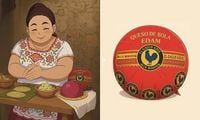Ciudad de México, México - The beloved queso de bola, a staple ingredient in many local dishes such as marquesitas and queso relleno, has seen a staggering price increase in Yucatán recently, with costs soaring up to 800 pesos in some stores. This dramatic rise from its traditional price range of 340 to 420 pesos has sparked concern among both consumers and merchants.
According to various local suppliers, the primary cause of this price hike is a shortage attributed to delays in the arrival of imported shipments. While no official explanation has been provided, reports suggest a combination of logistical issues, including customs problems affecting the release of dairy products, as well as a surge in exports to other countries, which has diminished the volume available for the domestic market.
The queso de bola, which originates from the Netherlands, is characterized by its distinctive red rind. Mexico relies heavily on imports of this type of cheese, meaning any disruption in the global supply chain directly impacts local prices. The increase has hit the Yucatecan culinary sector particularly hard. Vendors of marquesitas, one of the state’s most iconic desserts, have already begun adjusting their prices or substituting ingredients. Some restaurants specializing in traditional Yucatecan cuisine have even opted to temporarily remove queso relleno from their menus due to the lack of supply.
“It’s frustrating. Not only has the price gone up, but there’s simply no stock. We paid almost double for the last batch, and we don’t know when more will arrive,” commented a merchant from the Lucas de Gálvez market.
Meanwhile, local authorities have yet to issue any statements regarding the situation. Merchants are calling for support or at least some certainty about the regularization of supply in the coming weeks, as demand remains high while availability has plummeted. For now, queso de bola has become a luxury for many Yucatecans, and its absence not only affects wallets but also threatens a key aspect of the region's culinary identity.
In a related note, on the same day, May 7, 2025, the Cámara Nacional de la Industria Restaurantera y Alimentos Condimentados (Canirac) confirmed the ongoing shortage of Edam cheese, known locally as queso de bola. The price of this cheese has reached 700 pesos, further underscoring the supply challenges faced by the industry.
Claudia González Góngora, the state president of Canirac, noted that the shortage has been lingering for several months, primarily due to shipping issues. She explained that this semi-hard cheese, which hails from the city of Edam in North Holland, is in high demand in Yucatán, even exceeding consumption levels in its place of origin.
González Góngora mentioned that queso de bola is essential for preparing a variety of local dishes, including queso relleno, empanadas, salbutes, marquesitas, ice cream, and pastries. This high demand has exacerbated the scarcity amid importation problems, a situation not confined to Yucatán, as neighboring Quintana Roo has also reported shortages of Edam cheese.
According to distributors, the normalization of the product's supply could occur within this month or the next. However, she also pointed out that there are other varieties of cheese that could serve as substitutes, although many have been reluctant to consider this option, preferring to continue offering queso de bola.
As the situation unfolds, the culinary landscape in Yucatán remains in a delicate balance, with local businesses navigating the challenges posed by rising prices and dwindling supplies. The future of queso de bola, a beloved ingredient that holds a special place in the hearts and plates of many Yucatecans, hangs in the balance.


